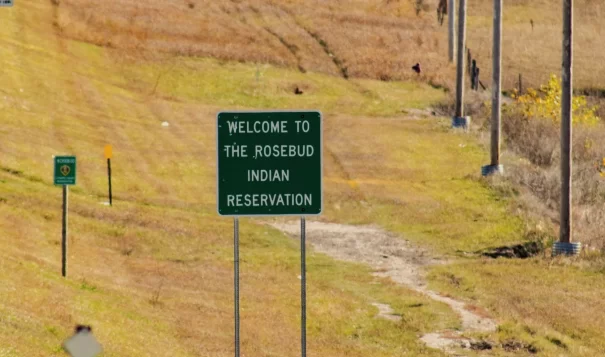News Based on facts, either observed and verified directly by the reporter, or reported and verified from knowledgeable sources.
Fourth tribe bans Gov. Kristi Noem
 The Rosebud Sioux Tribe is the fourth tribe to ban South Dakota Gov. Kristi Noem. (Photo by Amelia Schafer, ICT/Rapid City Journal)
The Rosebud Sioux Tribe is the fourth tribe to ban South Dakota Gov. Kristi Noem. (Photo by Amelia Schafer, ICT/Rapid City Journal)
South Dakota Gov. Kristi Noem was banned by a fourth tribal nation on April 11
The Rosebud Sioux Tribe announced it joined four other Lakota tribes in banning South Dakota Governor Kristi Noem.
Noem’s banishment was announced through a statement from the tribal council on April 11 in response to a string of allegations made by Gov. Kristi Noem throughout the past few weeks.
The tribal council said it decided to ban Noem in solidarity with the Oglala Sioux Tribe, Cheyenne River Sioux Tribe and Standing Rock Sioux Tribe.
“Governor Noem claims she wants to establish meaningful relationships with Tribes to provide solutions for systemic problems. However, her actions as Governor blatantly show otherwise,” the April 11 press release said. “Her disingenuous nature towards Native Americans to further her federal political ambitions is an attack on Tribal sovereignty that the Rosebud Sioux Tribe will not tolerate.”
The council stated that moving forward it will only acknowledge Noem after she issues a public apology to the Oceti Sakowin and presents a plan of action for supporting and empowering the Lakota people through policy and legislation.
The four Lakota nations that have banned Noem so far all cited similar concerns leading up to Noem’s banishment, specifically her recent statements regarding cartel presence, poor education and poor parenting on reservations. However, the Rosebud Sioux Tribe’s tribal council stressed that this decision was also due to longstanding issues with Noem since she took office in 2019.
The tribal council cited concerns with Noem’s support of the Keystone XL Pipeline in 2019 and an increase in penalties for pipeline protestors. The council also referenced Noem’s opposition of COVID-19 checkpoints in the Pine Ridge and Cheyenne River Reservations, removal of teaching standards regarding Native American history, legal threats to the Flandreau Santee Sioux Triberegarding its medical cannabis operations, return of unused Emergency Rental Assistance funds in 2022 without consulting tribes, and delayed response to a 2022 winter storm that killed four Rosebud Sioux Tribe citizens.
Following Noem’s remarks on Jan. 31 regarding cartel presence on reservations, the Rosebud Sioux Tribe requested that its tribal flag be removed from the South Dakota state Capitol. The April 11 press release said Noem has refused to return the flag and has been repeatedly dismissed.
Previously when discussing Noem’s banishment from tribal nations, state Communications Director Ian Fury said the banishments were “counterproductive” and encouraged tribal leaders to banish cartels.
Hours before her banishment from the Rosebud Sioux Tribe, Noem and South Dakota Attorney General Marty Jackley announced a new program meant to combat a lack of law enforcement on reservations. The program would allow potential tribal law enforcement to be trained in Pierre rather than New Mexico at the Indian Police Academy.
Dateline:
RAPID CITY, N.D.
